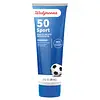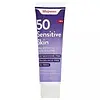What's inside
What's inside
 Key Ingredients
Key Ingredients

 Benefits
Benefits

 Concerns
Concerns

 Ingredients Side-by-side
Ingredients Side-by-side

Butyl Methoxydibenzoylmethane 3%
UV AbsorberHomosalate 10%
Skin ConditioningEthylhexyl Salicylate 4.5%
UV AbsorberOctocrylene 8%
UV AbsorberWater
Skin ConditioningPolyester-7
Skin ConditioningNeopentyl Glycol Diheptanoate
EmollientGlycerin
HumectantStyrene/Acrylates Copolymer
Aluminum Starch Octenylsuccinate
AbsorbentSilica
AbrasivePhenoxyethanol
PreservativeIsododecane
EmollientArachidyl Alcohol
EmollientBeeswax
Emulsion StabilisingEthylhexylglycerin
Skin ConditioningAcrylates/C10-30 Alkyl Acrylate Crosspolymer
Emulsion StabilisingBehenyl Alcohol
EmollientTocopherol
AntioxidantArachidyl Glucoside
EmulsifyingGlyceryl Stearate
EmollientPEG-100 Stearate
Potassium Hydroxide
BufferingDisodium EDTA
Sodium Ascorbyl Phosphate
AntioxidantParfum
MaskingButyl Methoxydibenzoylmethane 3%, Homosalate 10%, Ethylhexyl Salicylate 4.5%, Octocrylene 8%, Water, Polyester-7, Neopentyl Glycol Diheptanoate, Glycerin, Styrene/Acrylates Copolymer, Aluminum Starch Octenylsuccinate, Silica, Phenoxyethanol, Isododecane, Arachidyl Alcohol, Beeswax, Ethylhexylglycerin, Acrylates/C10-30 Alkyl Acrylate Crosspolymer, Behenyl Alcohol, Tocopherol, Arachidyl Glucoside, Glyceryl Stearate, PEG-100 Stearate, Potassium Hydroxide, Disodium EDTA, Sodium Ascorbyl Phosphate, Parfum
Octocrylene 4%
UV AbsorberZinc Oxide 5%
Cosmetic ColorantWater
Skin ConditioningEthylhexyl Stearate
EmollientDiisopropyl Adipate
EmollientCetyl Dimethicone
EmollientPolyglyceryl-4 Isostearate
EmulsifyingCetyl PEG/PPG-10/1 Dimethicone
EmulsifyingHexyl Laurate
EmollientIsohexadecane
EmollientBeeswax
Emulsion StabilisingAloe Barbadensis Leaf Juice
Skin ConditioningDimethicone
EmollientHydrogenated Castor Oil
EmollientSilica
AbrasiveTriethoxycaprylylsilane
Caprylyl Glycol
EmollientTocopheryl Acetate
AntioxidantPhenoxyethanol
PreservativeDisodium EDTA
Sodium Chloride
MaskingOctocrylene 4%, Zinc Oxide 5%, Water, Ethylhexyl Stearate, Diisopropyl Adipate, Cetyl Dimethicone, Polyglyceryl-4 Isostearate, Cetyl PEG/PPG-10/1 Dimethicone, Hexyl Laurate, Isohexadecane, Beeswax, Aloe Barbadensis Leaf Juice, Dimethicone, Hydrogenated Castor Oil, Silica, Triethoxycaprylylsilane, Caprylyl Glycol, Tocopheryl Acetate, Phenoxyethanol, Disodium EDTA, Sodium Chloride
 Reviews
Reviews

Ingredients Explained
These ingredients are found in both products.
Ingredients higher up in an ingredient list are typically present in a larger amount.
Beeswax is natural wax produced by honey bees and can be synthetically created. It consists mainly of fatty acid esters and long-chain alcohols.
In cosmetics, beeswax is a emollient. Due to its waxy structure, it creates a protective barrier. This barrier prevents water from evaporating off the skin.
This may not be a good ingredient for oily skin. We recommend speaking with a professional if you have concerns.
Beeswax cannot be removed with water, but can be taken off with an oil cleanser.
Beeswax is also antiseptic and contains vitamin A.
Learn more about BeeswaxDisodium EDTA plays a role in making products more stable by aiding other preservatives.
It is a chelating agent, meaning it neutralizes metal ions that may be found in a product.
Disodium EDTA is a salt of edetic acid and is found to be safe in cosmetic ingredients.
Learn more about Disodium EDTAOctocrylene protects skin from sun damage. It absorbs UV-B with peak absorption of 304 nm. It is a common sunscreen ingredient and often paired with avobenzone, a UVA filter. This is because octocrylene stabilizes other sunscreen ingredients by protecting them from degradation when exposed to sunlight. Octocrylene is a photostable ingredient and loses about 10% of SPF in 95 minutes.
Octocrylene also acts as an emollient, meaning it helps skin retain moisture and softens skin. It is oil-soluble and hydrophobic, enhancing water-resistant properties in a product.
Those who are using ketoprofen, a topical anti-inflammatory drug, may experience an allergic reaction when using octocrylene. It is best to speak with a healthcare professional about using sunscreens with octocrylene.
The EU allows a maximum of these concentrations:
Learn more about OctocrylenePhenoxyethanol is a preservative that has germicide, antimicrobial, and aromatic properties. Studies show that phenoxyethanol can prevent microbial growth. By itself, it has a scent that is similar to that of a rose.
It's often used in formulations along with Caprylyl Glycol to preserve the shelf life of products.
Silica, also known as silicon dioxide, is a naturally occurring mineral. It is used as a fine, spherical, and porous powder in cosmetics.
Though it has exfoliant properties, the function of silica varies depending on the product.
The unique structure of silica enhances the spreadability and adds smoothness, making it a great texture enhancer.
It is also used as an active carrier, emulsifier, and mattifier due to its ability to absorb excess oil.
In some products, tiny microneedles called spicules are made from silica or hydrolyzed sponge. When you rub them in, they lightly polish away dead skin layers and enhance the penetration of active ingredients.
Learn more about SilicaWater. It's the most common cosmetic ingredient of all. You'll usually see it at the top of ingredient lists, meaning that it makes up the largest part of the product.
So why is it so popular? Water most often acts as a solvent - this means that it helps dissolve other ingredients into the formulation.
You'll also recognize water as that liquid we all need to stay alive. If you see this, drink a glass of water. Stay hydrated!
Learn more about Water